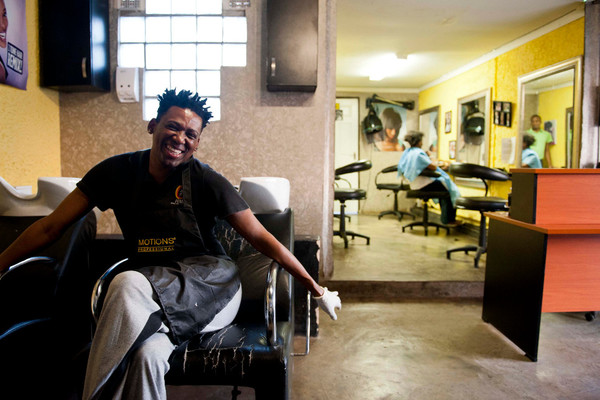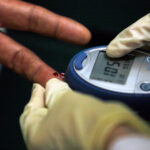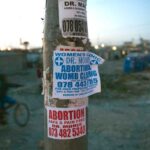Stereotyping prevents men who sleep with other men from accessing proper treatment and prevention of HIV infection.
“They asked me why I was sleeping with men knowing that it was [a] sin,” says Dingaan Cele*, frowning as he recalls sitting in a consultation room at a KwaMashu clinic north of Durban, surrounded by nurses who made him feel “less [than] human”.
“Then they took turns to quote Bible verses. They told me that ‘God created male and female’,” his voice rises with emotion as if transported back to that day five years ago. “I just sat there and listened. I felt helpless and could not defend myself.”
Cele sits at a table in a deserted, dimly lit restaurant in Durban’s Gateway mall. He had delayed seeking medical attention for two weeks until the “terrible pain in my anus became unbearable” because he was afraid of the treatment he would receive at a clinic.
That day, he had made a deliberate effort to “look normal” and abandoned his usual flamboyant attire.
“I put on a golf T-shirt and black pants and avoided the wig and make-up. I didn’t want to attract unnecessary attention to myself.”
No hiding
But despite his best efforts to “blend in”, Cele knew he could not hide his sexuality from the nurse at the clinic if he was to get any help.
“I told the nurse I had been having anal sex with men, which resulted in the infection. She simply gave me Anusol [cream used to treat haemorrhoids, or piles – swollen veins in the anus] and pain tablets,” says Cele. “She didn’t even examine me to confirm if I really had an anal infection.”
Sphelele Msimango, an outreach worker from the Durban Lesbian and Gay Community Health Centre and Mosaic men’s clinic, which provides free healthcare services for homosexuals in and around the city, says that what happened to Cele is not an isolated incident.
One of his clients, he says, was reduced to tears at a government clinic when he told nurses that he was gay and was experiencing pain, like Cele, in his anus.
“The nurse on duty called the rest of the clinic staff into the consultation room to help her as she ‘didn’t know how to deal with this’.”
Humiliation
Msimango says after his client’s body and infection were exposed to the “whole clinic staff” he had had enough. “He just pulled his pants up and stormed out, in tears.”
After a similarly humiliating experience that Cele says left him feeling “dirty” and “guilty”, he vowed never to go to a government clinic again – even though he was still in high school and not on medical aid.
It wasn’t until 2012, three years after his “ordeal”, that Cele eventually visited the Mosaic clinic, where he was diagnosed and treated for anal warts, which are caused by the human papilloma virus that is transmitted through sex.
“I am HIV positive and everyone knows. Revealing my status to the whole world on my social media profile was not as stressful as telling that nurse that I only have sex with men,” says Cele. “Sometimes it feels like being HIV positive is more acceptable than being gay.”
Unlike Cele, who is gay, a number of his sexual partners were “straight” – some were married to women and had families. Research indicates that this is not uncommon.
Bisexual
A 2011 University of the Witwatersrand study conducted in Soweto found that, of those surveyed, half of the men who have sex with men were also in relationships with women.
“We have found that some men who have sex with men don’t identify themselves as [gay]. So these are the guys who consider themselves heterosexual; they have sex mainly with women but sometimes with men,” explains Kevin Rebe, a physician specialising in HIV with the nonprofit organisation Anova Health Institute’s Health4Men project. The project, a partnership with the government, offers free sexual health services for men who have sex with men in Johannesburg and Cape Town. Health4Men is gearing up to expand into other African cities in the coming months.
“That population of men, they are not gay, they don’t aspire to be part of the gay culture, they just have the behaviour, they have sex with women and they have sex with men but they don’t like the stereotype.”
Rebe says this makes it difficult to get these men into the healthcare system.
The World Health Organisation (WHO) warns that failure to meet the healthcare needs of key populations at high risk of HIV infection, which includes these men, is a threat to the global Aids response because “these people are most at risk of HIV infection yet are least likely to have access to HIV prevention, testing and treatment services”.
New infections
Government figures estimate that 9.2% of new HIV infections in South Africa occur among men who have sex with men. The WHO recently published new guidelines on the prevention, diagnosis, treatment and care for key populations at an increased risk of HIV infection or transmission. According to these guidelines, gay and bisexual men are 19 times more likely to be HIV positive than the general population.
A 2011 article by the University of the Witwatersrand, published in the Journal of Public Health Policy, found that, “except for a few externally funded nongovernmental organisation programme initiatives, government services targeting [men who have sex with other men] were scarce”.
Nonhlanhla Mkhize, director of the Durban Lesbian and Gay Community Health Centre and Mosaic clinic, says that reluctance from the provincial government to form a solid partnership with her organisation makes it difficult to get funding.
“Donors are only willing to help if we have a clear partnership with the government.
“There is no political will from the government to support the promotion of the sexual healthcare for men who have sex with men in KwaZulu-Natal [even] though the province has the highest number of people living with HIV in the country,” she says.
In response to questions about whether the province had clinics that cater to the healthcare needs of men who have sex with other men, the KwaZulu-Natal deputy manager for media liaison at the health department, Agiza Hlongwane, in an email said: “How are such clinics supposed to differ from other conventional public clinics? In other words, what kind of services would these men need that are different to those of other healthcare users?”
Reliant on volunteers
Mkhize says the organisation relies on volunteers like Msimango to reach out to these men. “We are in dire need of informed nurses and community members whose mentalities will not hinder these men from accessing healthcare.”
Apart from the sparse services available for men who have sex with men, studies show that negative attitudes from healthcare workers also prevent them from seeking medical care until it is almost too late, something Rebe says is risky.
“For example, if a man has anal syphilis it will cause a sore that will break the anal lining and he will be exposed to HIV because the sore becomes an entry point for the virus,” he says. “Some sexually transmitted infections [such as the human papilloma virus] can even cause cancer.”
Rebe says these men struggle to access sexual healthcare services because they are scared of the stigma and discrimination they might suffer from healthcare practitioners based on judgements about their perceived HIV status or sexuality.
“I think nurses are not well trained to pick up where the sexual risks that lie with men who have sex with men are. There is a huge gap in that area,” says Rebe, who was part of the committee that drafted the WHO guidelines.
“[Their] risk is associated with unprotected anal sex and barriers to accessing appropriate health services.”
No condoms
A Human Science Research Council survey found that half of sexually active people between the ages 15 and 49 did not use condoms with their last sexual partner.
Over and above looking after their healthcare needs, Rebe says that public health institutions should provide as much information on safe sex for men who have sex with men as is provided for heterosexual patients.
“Most public clinics are female-friendly and always focus on breast-feeding, pap smears and prevention of mother-to-child transmissions [of HIV] and make little effort to accommodate men in healthcare services.
“If a clinic is going to properly take care of [men who have sex with other men], they need to be more sensitive. Sensitivity is to truly understand who men who have sex with men are, identify them and do proper anal examination for sexually transmitted infections because some of the infections have no symptoms.”
Since his close call all those years ago, Cele’s lifestyle has changed. “I no longer have multiple sexual partners. I am in a committed relationship. We even discuss getting tested [for HIV and sexually transmitted infections] and I go to the Mosaic clinic often to get free condoms and lubrication.”
*Not his real name.
A place of refuge from discrimination
Pictures of brides hang on the yellow and silver-painted walls of Embelesh House of Beauty, a hair salon in Umlazi, southeast of Durban.
A few men are sitting on the couches at one end of the room while others go about their work, washing and styling customers’ hair. The laughter in the room is contagious.
For most of these men, it is a welcome relief from the judgment they face in their daily lives.
“Many gay men are being rejected by their friends and families, so this is the one place in the township where they feel accepted and understood,” says Samkele Shelembe, the owner of the salon, who describes himself as “gay and proud”.
Shelembe says he is one of the luckiest gay men because his family didn’t reject him when he told them that he is gay. He extended his family’s support to other men when he opened Embelesh at the back of his mother’s yard in 2007 because “we all need love and support”.
“This salon has become a little home for gay men who need time off from societal stigma and family disputes,” he says.
A 2011 University of the Witwatersrand study conducted in Soweto found that half of the men who have sex with men who took part in the research were HIV positive. The study also found that half of the men surveyed had sex with both men and women.

Shelembe lost two of his friends to Aids. The loss spurred him to formalise the gatherings of gay men at his salon.
“Instead of just hanging around, we now have monthly meetings where we discuss sex, relationships, stigma and acceptance, and share our experiences,” says Shelembe.
“We can’t just sit back and expect someone else to be responsible for our wellbeing.”
Shelembe, who holds a diploma in hair and cosmetology, believes that opening his salon to other gay men in his community has helped his patrons to access sexual health information.
“Some of the men who have sex with men I’ve spoken to have been mistreated in public clinics. Nurses have a way of asking questions, which makes us uncomfortable, and at the end of the day we feel the nurses do not really want to attend to our sexual healthcare needs.”
According to a 2012 article published in the online South African Journal of HIV Medication, discrimination, healthcare worker ignorance and the “heterosexual focus of the HIV response” increase the vulnerability of men who have sex with men to HIV infection. This population group’s risk of HIV infection is 19 times higher than the general population, according to the World Health Organisation.
“Gay men are here to stay,” he says. “I think it’s time for government to introduce more inclusive health education and services that target men who have sex with men.”
Shelembe says he knows of only one clinic that caters for men who have sex with men in Durban. It is run by a nongovernmental organisation.
“But with high unemployment rates, some people cannot even afford the R40 taxi fare to go to Morningside [Durban Central],” he says. “Men who cannot afford private doctors and clinics are at a disadvantage.” – Thandeka Moyo
Fast facts
- Globally, gay men have a 19 times higher risk of HIV infection than other population groups.
- In South Africa, men who have sex with men account for 9.2% of new HIV infections.
- Globally, more than 40% of the adult population of men who have sex with men are HIV positive.
- In Africa 50% of men who have sex with men also have sex with women.
- A survey in Soweto found that HIV prevalence among men who have sex with men is up to 50%.
- Consistent condom and lubricant use can prevent new HIV infections by up to 76%.
- Risk of HIV transmission during receptive unprotected anal intercourse is 16 times higher than in unprotected vaginal intercourse.
- Pre-exposure prophylaxis reduces the risk of HIV infection by 92%. – Thandeka Moyo
Sources: The National Strategic Plan on HIV, Sexually Transmitted Infections and TB; the World Health Organisation; the Southern African Journal of HIV Medication; and the Anova Health Institute
Thandeka Moyo was a Bhekisisa fellow.









